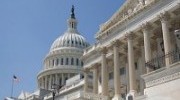 Secretary of the Army John McHugh said in an interview with the Army Times that the Army could handle a repeal of the controversial Don’t Ask, Don’t Tell policy without major disruption, but refused to offer his personal views on the issue. From the Army Times:
Secretary of the Army John McHugh said in an interview with the Army Times that the Army could handle a repeal of the controversial Don’t Ask, Don’t Tell policy without major disruption, but refused to offer his personal views on the issue. From the Army Times:
McHugh finds himself at the center of debate over Obama’s pledge to repeal the law banning open service by homosexuals.
In the interview, McHugh carefully avoided offering his personal views on the issue, saying his job now is to provide input to Obama on how to make the change and to talk with members of Congress about the issue.
Selling the idea to Congress, which has the final say, could depend on exactly what the administration tries to do in terms of the timing of repeal and how it is applied, McHugh said.
It’s possible, for example, that homosexuals could be allowed into some occupations or units but barred from others, McHugh said, stressing that he was not aware of any such plans but only discussing how the issue might play out.
“I don’t want to prejudge the situation,” he said. “I am saying if he did that, it would be my job to explain it when the appropriate time comes.”
When asked specifically if lifting the gay ban would seriously disrupt the military, as predicted by those who oppose repeal, McHugh said there is no reason to think major turmoil would ensue.
“Anytime you have a broad-based policy change, there are challenges to that,” he said. “The Army has a big history of taking on similar issues, [with] predictions of doom and gloom that did not play out,” he said.
During hearings on DADT back in 2008, McHugh, who then served as a Republican congressman from New York, appeared disappointed with the DoD’s failure to review the policy…
“I share the chairlady’s [Rep. Susan Davis] disappointment that thus far the services, as a whole, have not agreed to step forward. I don’t see as an individual member how I fully and fairly consider this question and more importantly the issue of changing this question without the input of those in the active military who have the heavy responsibility of commanding our forces in time of war. I would hope and encourage both the Department of Defense and the various services to reconsider the reluctance that they have displayed to this point.”
 In a historic vote today the Senate
In a historic vote today the Senate  Last week Rep. Pete Stark of California introduced the
Last week Rep. Pete Stark of California introduced the